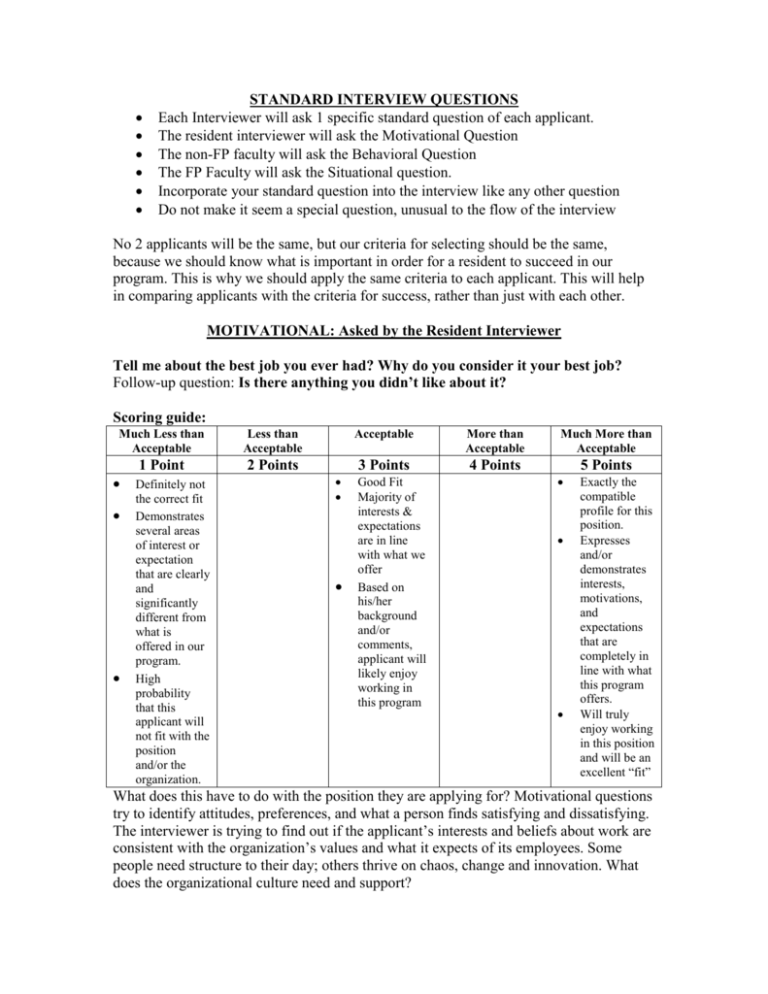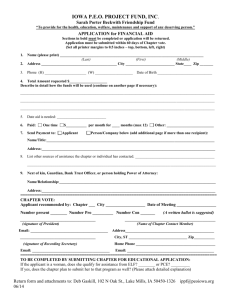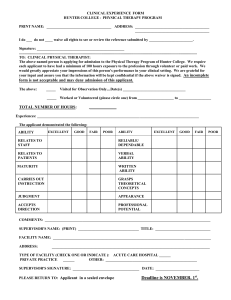Interview Questions for Physician Employment
advertisement

STANDARD INTERVIEW QUESTIONS Each Interviewer will ask 1 specific standard question of each applicant. The resident interviewer will ask the Motivational Question The non-FP faculty will ask the Behavioral Question The FP Faculty will ask the Situational question. Incorporate your standard question into the interview like any other question Do not make it seem a special question, unusual to the flow of the interview No 2 applicants will be the same, but our criteria for selecting should be the same, because we should know what is important in order for a resident to succeed in our program. This is why we should apply the same criteria to each applicant. This will help in comparing applicants with the criteria for success, rather than just with each other. MOTIVATIONAL: Asked by the Resident Interviewer Tell me about the best job you ever had? Why do you consider it your best job? Follow-up question: Is there anything you didn’t like about it? Scoring guide: Much Less than Acceptable Less than Acceptable 1 Point 2 Points Definitely not the correct fit Demonstrates several areas of interest or expectation that are clearly and significantly different from what is offered in our program. High probability that this applicant will not fit with the position and/or the organization. Acceptable More than Acceptable 3 Points 4 Points Good Fit Majority of interests & expectations are in line with what we offer Based on his/her background and/or comments, applicant will likely enjoy working in this program Much More than Acceptable 5 Points Exactly the compatible profile for this position. Expresses and/or demonstrates interests, motivations, and expectations that are completely in line with what this program offers. Will truly enjoy working in this position and will be an excellent “fit” What does this have to do with the position they are applying for? Motivational questions try to identify attitudes, preferences, and what a person finds satisfying and dissatisfying. The interviewer is trying to find out if the applicant’s interests and beliefs about work are consistent with the organization’s values and what it expects of its employees. Some people need structure to their day; others thrive on chaos, change and innovation. What does the organizational culture need and support? BEHAVIORAL: Asked by the Non FP Faculty Interviewer Talk about a time when you were criticized for the patient care you provided. How did you deal with that? Scoring guide: Much Less than Acceptable Less than Acceptable 1 Point 2 Points Reluctant to admit mistakes Procrastinates in giving information to others Never made a mistake Acceptable More than Acceptable 3 Points 4 Points Acts with the patient in mind Tells about specific example, what they did, and the result. Appropriately seeks more experienced counsel when making complex decisions. Much More than Acceptable 5 Points Verbalizes an insightful and appropriate response Understands why the error occurred, and how it can be avoided in the future Don’t be mislead by the term “Behavioral.” These types of questions ask the applicant to describe an actual experience and something they really did as opposed to a hypothetical situation. The applicant should not answer by saying what they would do if they ever had this happen to them, but should say what they actually did in a real experience. This is a very powerful type of question, because even if they know the textbook answer of what they should do in a situation, we don’t know if they are able to perform the actions they say they would take. Actual experience is a better predictor of future behavior. How should they answer it? First, they should recognize that this is a behavioral question that requires them to describe their actual experience of what they did. They should frame their answer using the “BAR” approach to presenting their answer: Background, Action they took, Result. You can use this structure to organize your notes on their answer. Background: Set the stage. Example: I was a third year student, and I had a patient that… Action: I asked the nurse to let me review the chart, and I called the attending when I discovered that…. Result: The attending adjusted the medications and showed me how to …. And I explained this to the patient, and she was satisfied. SITUATIONAL: Asked by the FP Faculty Interviewer You are in the middle of a busy clinic session seeing a new patient. She is a 55-yearold woman complaining of shortness of breath. Tell me your differential diagnosis. Follow up question: How would you evaluate this patient’s problem? Scoring guide: Much Less than Acceptable Less than Acceptable 1 Point 2 Points Unable to outline a DDX Doesn’t know what other patient information he/she needs Confused approach to evaluating the patient Acceptable More than Acceptable 3 Points 4 Points Identifies at lease 3 possible causes of SOB Asks for appropriate clinical information (PMH, Tobacco, Meds, ROS, VS) Uses reasonable approach to assess patient Much More than Acceptable 5 Points Easily describes a detailed DDX Skillfully obtains medical HX and current medical information Sophisticated approach to evaluating this patient in the office setting This is different from a behavioral question. Situational questions test how well the applicant can analyze a problem, how they involve others or obtain and incorporate additional information in the decision making process. The applicant should answer the question you asked, and can either ask you for more information, or add theoretical information themselves that will demonstrate their understanding of the complexity of the problem. They should not make the situation more complicated than necessary. Sometimes the applicant will have an actual experience similar to the question, but they should make sure they address the case you asked them to describe. Other Questions for Consideration As General Questions: Describe your ideal residency environment and opportunity. What is important to you in selecting a residency program? What attracts you to this program? How would your patients describe you? What do you do to achieve that? What kinds of patients give you the most difficulty? How do you handle that? What individuals have most influenced your physician style? What are your values? How do you apply them in your actions? Describe situations where you have applied these values. How do you cope with stress? What sort of patients do you enjoy working with? What type of patients are the most challenging for you? What sort of things frustrates you the most? What is most important in your job to be happy and successful? What are the life/work balance issues that are important to you? How do you maintain this balance? On a daily basis, what motivates you? What discourages you? Give me an example of a patient encounter where your relationship with the patient was the most important tool you used. What kinds of people do you work best with? Worst with? What areas has your medical school training best prepared you for residency training? How do you like to be evaluated? Who do you want feedback from? How do you think this can best be accomplished? What electives have you chosen in your training and why? What were your strongest clinical rotations? How did you know that? What clinical rotations gave you the most difficulty? How satisfied are you with your medical school training program? What would you have changed about your medical school experience if you could? What leadership roles have you taken? What community activities have you participated in? What personal considerations or needs do you have? What do you do for fun? What do you want us to remember about you? Why would you be a better family physician than any other kind of physician?






